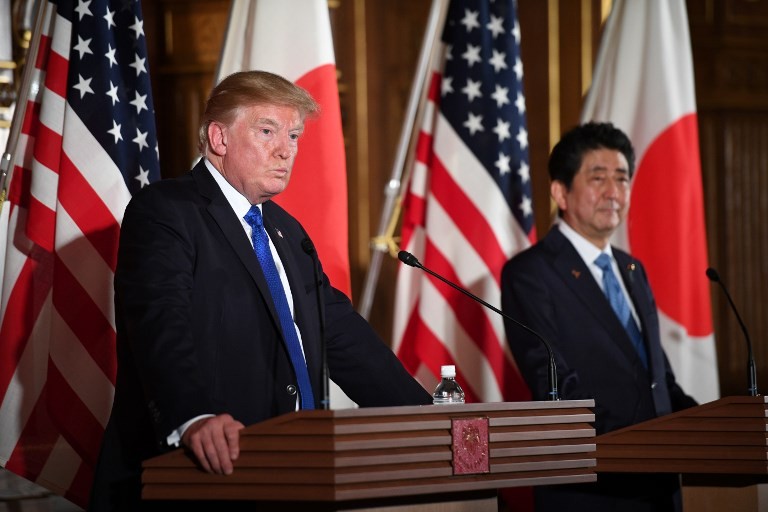Why golf may not be enough to sustain Trump-Abe bond this time
Shinzo Abe's meeting with Donald Trump might be more tense as the latter would meet Kim Jong-un.
Change Size
 US President Donald Trump and Japanese Prime Minister Shinzo Abe (right) attend a joint press conference at Akasaka Palace in Tokyo on Nov. 6, 2017. Donald Trump described North Korea's nuclear missile program as a (Agence France -Presse/Jim Watson)
US President Donald Trump and Japanese Prime Minister Shinzo Abe (right) attend a joint press conference at Akasaka Palace in Tokyo on Nov. 6, 2017. Donald Trump described North Korea's nuclear missile program as a (Agence France -Presse/Jim Watson)
J
apanese Prime Minister Shinzo Abe’s five meetings with US President Donald Trump have been relaxed affairs, marked by rounds of golf and warm praise. Their sixth encounter may be more tense.
While the allies may get some green time during two days at Trump’s Mar-a-Lago estate in Florida, Abe will be carting a raft of worries among his golf clubs. He sought the meeting last month after Trump’s surprise decision to meet with North Korean leader Kim Jong-un, only to receive a wave of fresh criticism from the US president, who complained on Twitter that Japan had “hit us hard on trade for years.”
The pair, however, could commiserate over shared political troubles. Although Abe’s not facing anything like Robert Mueller’s Russia investigation, a flurry of media-driven scandals have prompted protests and made him less popular than Trump. Here are some issues they’re likely to discuss.
When Abe hosted Trump in November, the Japanese leader had just been propelled to reelection in part by joining Trump’s push to apply “maximum pressure” on North Korea. The decision to grant Kim an unprecedented presidential summit meeting without a clear path to giving up his nuclear arsenal, sent Abe scrambling to recalibrate, even floating his own possible summit with the North Korean leader.
The prime minister told reporters before leaving Tokyo on Tuesday that he wanted “to confirm ‘maximum pressure’ will continue” and ensure Japanese issues, such as citizens abducted by North Korea in the 1970s and 1980s, will be addressed. Japan has also expressed concerns about Kim’s arsenal of mid-range ballistic missiles that threaten it, but not the US mainland.
White House Press Secretary Sarah Huckabee Sanders predicted the meeting would “be very positive.” “Obviously, the president has got a great relationship there,” Sanders told reporters Monday en route to Florida.
Any illusions Abe had about quieting Trump’s decades-long criticism of Japanese trade practices vanished last month when the US declined to spare its ally from tariffs on steel and aluminum. Trump’s complaints center on America’s stubborn trade deficit, which last year was about US$69 billion, third behind China and Mexico by US calculations.
Reports last week that the U.S. president was reviewing a return to the Trans-Pacific Partnership -- an 11-nation trade pact that Abe helped rescue after Trump’s withdrawal -- provided brief comfort. Trump later said he wanted a bilateral trade deal with Japan and wouldn’t consider coming back to TPP without major revisions -- a demand Abe will probably try to discourage him from this week.
Trump’s related effort to rally Japan and other like-minded allies to force China to open its markets to more foreign competition also comes at a tricky time for Abe. The Japanese leader has spent much of his five-year tenure trying to repair fraught ties with his larger neighbor and appears close to securing a summit with Chinese President Xi Jinping.
Abe might cite developments this week to show Trump how US moves have actually pushed the two countries closer together. Foreign ministers from China and Japan agreed Sunday to work more closely on North Korea and China wants Japanese cooperation against the US’s metals tariffs, Kyodo News reported Saturday, citing people close to the talks.
If there’s a bright side to being in sunny Florida for Abe, it’s that he’s not in Japan. Abe has left behind a government reeling from a series of scandals that in just two months have turned his odds of becoming Japan’s longest-serving prime minister from sure thing to open question.
It’s unclear whether that political weakness will help or hurt Abe in talks with Trump. Masamichi Adachi, senior economist at JPMorgan Securities Japan, said that domestic woes may help Abe gain some U.S. concessions. “Abe is better for the US than someone they don’t know, so they may want to give him something,” Adachi said.









